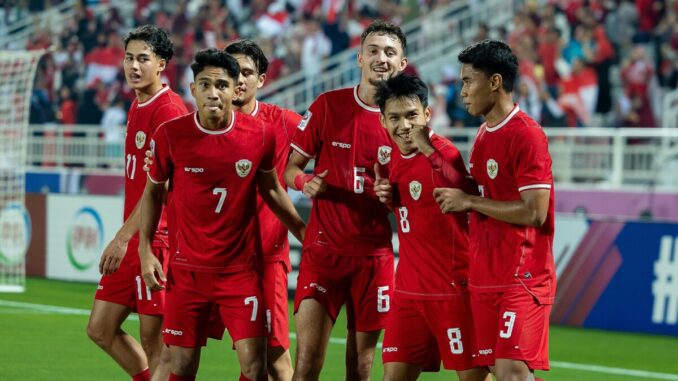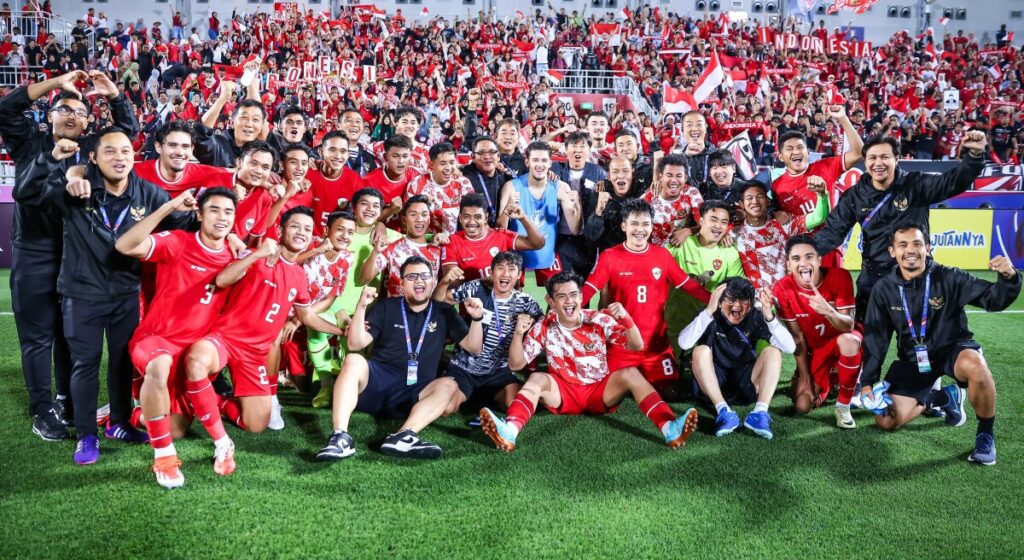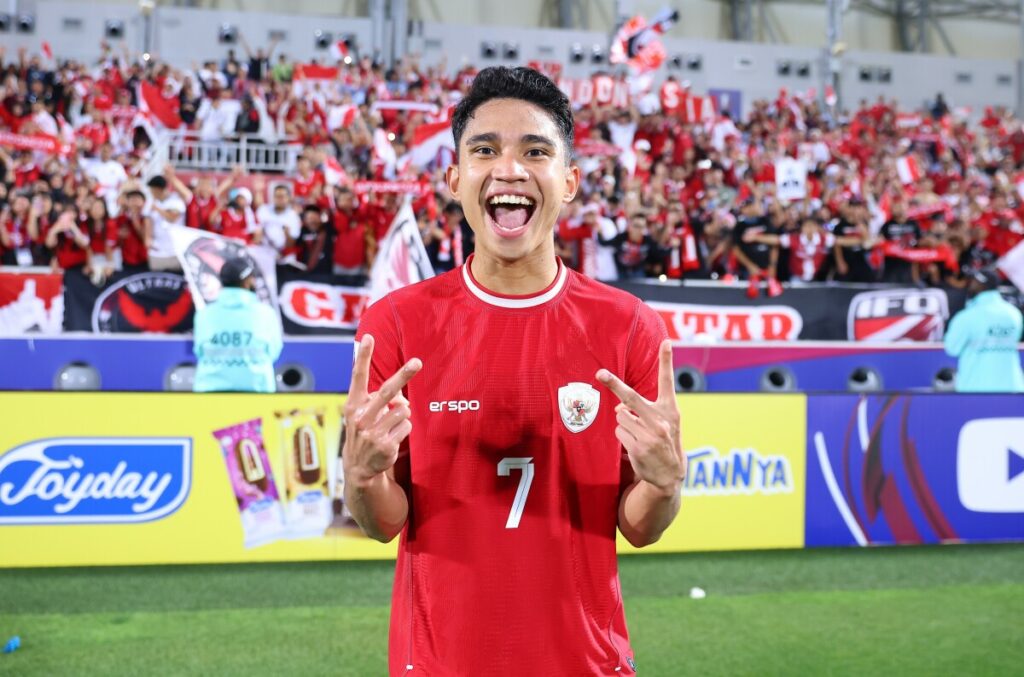
The premise of this article has been written periodically for the past few decades, that’s how long Indonesia has been talked about as the sleeping giant of Asian football.
The nation, an archipelago consisting of over 17,000 islands and home to over 270 million people, has for a long time teased its football potential but never realised it. Not by a long way.
Few nations in Asia are as passionate about the game as Indonesia, something that has at times been its downfall, with an unacceptably high number of fan deaths over the previous few decades.
But, when it’s full, there are few more hostile or exhilarating places to play in Asia than Jakarta’s Gelora Bung Karno Stadium. It is a powder keg of emotion that is not just a 12th man, but a 13th and 14th as well.
It’s been said so many times it’s almost a cliché, but if only they could get it right, Asia would have a new superpower.
With a booming economy, a growing and young population and a passion for football like few others, all the ingredients are there.
“If they actually get their act together, then no one else in Southeast Asia can match them,” Michael Church said on The Asian Game Podcast last month.
“I mean, they’re not even close in my opinion, because they have such a depth of passion, depth of talent, and this is just even within the nation as it stands, nevermind even tapping into the overseas community.
“I think if someone has finally lit the blue touchpaper in Indonesia, stand back because they’re going to be amazing.”
Of course, they were, technically, the first Asian nation to qualify for the FIFA World Cup back in 1938 when they were still the Dutch East Indies under Dutch occupied rule. But they haven’t come close to repeating that feat since declaring independence in 1945.

“Indonesia is really the Brazil of Asia,” said the late Peter Velappan, at the time the secretary general of the Asian Football Confederation (AFC), back in 1998.
“They play with an intelligence and flair unique in this part of the world. The talent in Indonesia is better than Korea’s or Japan’s, but they have neither the organisation nor the will to clean up corruption.”
That was 26 years ago, and sadly the same is still true today. The country’s fortunes are still being impeded by mismanagement and systemic corruption, while off-field violence continues to tar its reputation, as witnessed with the Kanjuruhan Stadium disaster in 2022 that killed more than 130 and left countless more injured.
The raw ingredients, however, continue to tantalise.
They are still a long way from awakening and realising their latent potential, but on-field at least there are green shoots emerging that suggest the future for Garuda is indeed quite bright.
It was on display at the AFC Asian Cup in January, when they reached the Round of 16 for the first time in their history, defeating Vietnam to record just their third ever win at the tournament.
While there were 1-3 losses to both Iraq and Japan, and a 0-4 loss to Australia in the Round of 16, those scorelines don’t tell the full story of their performances.
Shin Tae-yong’s young side left Doha with their reputations, and their heads, held high after troubling their more fancied opponents; all that was missing was a coat of polish to finish off all their good work.
“We have a really young team, but we have good players and we know we can play football and we wanted to show courage and go at Australia instead of waiting like cowards because it’s not the way you want to go into a game,” Shayne Pattynama told The Asian Game after their loss to Australia in January.
“That high line, keeping the ball, going forward and playing; we’re starting to feel that we can really grow now because we have great talents and this is only the start for Indonesia.”
It was on display again in back-to-back wins over Vietnam to all but secure their passage through to the third round of qualifying for the FIFA World Cup, the first time Indonesia has ever made it through to the deciding round.
Now, back in the Qatari capital again, their under-23 outfit are showing those performances were no flash in the pan, but rather a sign of real improvement from the nation ranked 134 in the FIFA rankings.
Indonesia’s 1-0 win over Australia last week at the Abdullah bin Khalifa Stadium, their first ever win at the AFC U23 Asian Cup, was a major step forward.
Despite declining fortunes, Australia is still considered one of the top nations in Asia and their scalp, especially for a developing nation like Indonesia, will always be considered a big one.
Following that up with an emphatic 4-1 win over Jordan to seal their progression to the quarter finals represents a significant milestone for Asia’s third most populous nation.
In a tournament that doubles as Olympic qualification, they are now one step closer to Paris 2024, something that might have been considered a long shot just a few months ago. Only Japan or Korea Republic now stand in their way of either Olympic qualification or, at worst, a playoff with Guinea for the sixteenth and final spot in Paris.
This speaks to the work that has been done by Shin Tae-yong over many years, nurturing a generation that contains some of Asia’s most exciting talent.
Many of the those shone at the senior Asian Cup in January, and with a lot of those backing up for the U23 Asian Cup are playing with a confidence that comes from frequent international exposure, particularly at senior level where nine of the 23 are already capped.
That Shin manages both sides undoubtedly aids that process. He knows them and they know him. There’s a trust in both directions, and the results of that are there for everyone to see.
It was there for Indonesia’s second against Jordan, a result of some beautiful interplay between Marselino Ferdinan, Rizky Ridho and Witan Sulaeman. It was there again as Pratama Arhan, Sulaeman and Marselino combined for their third.
What it means for the future could be genuinely exciting.
Marselino, at just 19, looks like he could become the superstar his country has craved for so long. Together with Sulaeman they have potential to be one of Asia’s best ‘Batman & Robin’ combinations; a duo as dangerous as they are likeable. They play football the way it should be played – attacking, aggressive and with a sense of fun.

Arhan, meanwhile, is showing the benefit of years spent abroad in Japan and Korea. His throw-ins are as dangerous as any set piece going and will continue to catch out even stronger defences than Jordan’s, as it did for Indonesia’s fourth.
Then there’s the increasing number of diaspora players, eligible for Indonesia through their heritage. Ivar Jenner, Justin Hubner, Rafael Struick and Nathan Tjoe-A-On are four at this tournament, while there are even more at senior level, adding depth and quality to a side brimming with home-grown talent.
Perhaps the only thing they need to sort out is their club situation.
Marselino, on the books of Deinze in the Belgian second division, has played just 16 minutes all season. Arhan barely featured for Tokyo Verdy during his two seasons in Japan’s second division, and is yet to feature for Suwon FC in the K League.
Sulaeman, who spent a few years floating around Eastern Europe with middling success, that included stopovers in Serbia, Poland and Slovakia, is now back in Indonesia, playing for Bhayangkara on-loan from Persija Jakarta.
He is good enough to be playing elsewhere and could do with a settled environment after playing at five clubs since 2021.
Getting more players abroad is paramount, as is ensuring that those who already are play regularly. At this crucial juncture in their careers and development, game time is everything.
All that can be sorted out down the track, however. For now, let’s just sit back and enjoy the ride and hope that maybe, finally, this time will be different.
Photo: Asian Football Confederation




